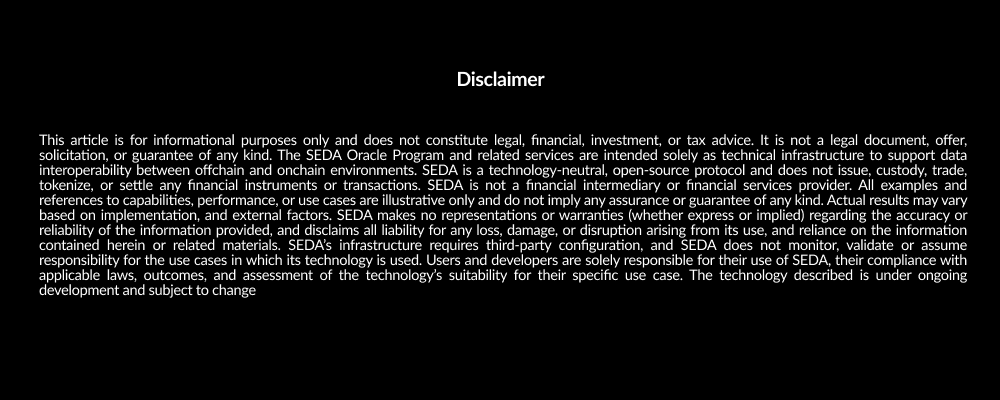RWAs Will Never Come Onchain
Education & Community
.png)
Arguably, the primary differentiator between RWA feeds and standard price feeds is that RWAs are influenced by the real-world environments in which they are traded. Assets such as stocks or commodities undergo events not inherently reflected on the blockchain, including stock splits, trading halts, stringent regulatory controls, and strict trading schedules.
While legacy oracles continue to claim they are bringing $20 trillion of RWAs onchain, the harsh reality is that meaningful onchain representation is stalled until oracles can reflect an asset's IRL conditions and not merely a synthetic price reflection.
Here are four ways SEDA provides long-term, dynamic solutions enabling RWA issuers to align assets and their real-world environments onchain:
- Reflecting Corporate Action Tracking Onchain
Corporate actions are events initiated by companies that directly affect shareholders, such as stock splits and dividend distributions. For RWAs to mirror these real-world events, the onchain assets must be inherently dynamic. Currently, issuers struggle to deploy RWAs capable of adapting their state to real-world occurrences.
SEDA addresses this challenge. Unlike legacy oracles, SEDA's programmable oracle infrastructure is highly flexible, enabling it to monitor multiple corporate action sources for relevant events continuously. Oracle Programs can be configured to detect events such as stock splits and relay this information onchain. Subsequently, smart contracts can automatically process this data to enact necessary state changes within the RWAs.
- Issuing New Assets in 90 Seconds
SEDA’s engineering and ecosystem teams regularly showcase their capability to rapidly launch new oracle programs for diverse data types. The internal record for creating a new feed stands at just 97 seconds, set by CTO Jasper De Gooijer.
Previously constrained by legacy oracle limitations, RWA issuers can now swiftly offer clients diverse, real-time feeds using SEDA. With the SEDA SDK, teams can swiftly define which data sources should be queried, specify required data types, and outline how this data is relayed onchain. This exceptional customization empowers RWA issuers to surpass mere synthetic price representation, delivering comprehensive and dynamic asset feeds in minutes rather than months.
- Mid-Flight Asset Monitoring, Tracking, and Pausing
By integrating with onchain monitoring tools like Chainalysis, SEDA provides real-time asset monitoring and tracking. Given that RWAs are frequently subject to strict regulatory frameworks, issuers must enforce compliance measures, such as transfer restrictions preventing RWAs from reaching OFAC blacklisted addresses.
Deploying a SEDA Oracle Program allows issuers to monitor and transfer the data to third-party applications. The third-party smart contract may, for example, pause transactions in real-time. This capability can help ensure compliance by aligning onchain data with offchain regulatory requirements, as required by authorities.
- KYC Compliance and Native Integrations
SEDA facilitates seamless compliance through native integrations with KYC platforms, such as Base or Inkonchain. Utilizing these integrations, RWA issuers can restrict asset availability exclusively to verified, KYC’d accounts.
By embedding regulatory compliance directly into the onchain framework, SEDA assists issuers in creating an accurate onchain representation of regulatory environments, essential for successfully transitioning RWAs onto the blockchain

.svg)


.png)
.png)
.png)
.png)
.png)


